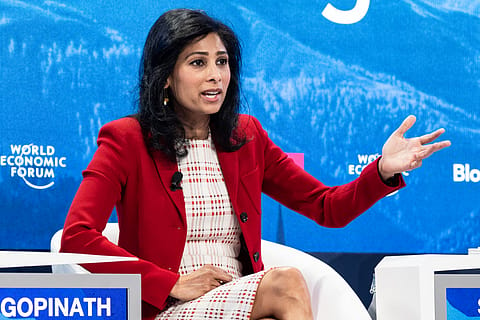Advanced economies to recover by 2024, emerging ones to decline 5%: Gopinath
There happens to be a confluence of shocks hitting the world at a time there are very divergent recoveries in the world, says IMF's Gita Gopinath.

The ongoing geopolitical crisis in Ukraine has pushed back global recovery as economies around the world were finally coming out of the pandemic-led shocks. As trouble continues to brew, the advanced economies will make full recovery in two years time, whereas emerging and developing economies will end up short of their expected growth during this time, points out International Monetary Fund’s Gita Gopinath.
“The war in Ukraine has been a major setback to the global recovery. We had a serious downgrade to global growth in April and the world continues to face headwinds because we have a cost of living crisis as price of commodities, including fuel, food, are going up around the world. Central banks trying to tackle these high levels of inflation are raising interest rates very sharply, and that they need to do. But that has consequences for global finance and trade,” Gopinath notes.
There happens to be a confluence of shocks hitting the world at a time there are very divergent recoveries in the world, mentions IMF’s first deputy managing director.
“We have advanced economies that based on our projections will basically get back where they would have been in the absence of pandemic in 2024, so literally no output losses. But we have emerging and developing economies that will be around 5% below where they would have been in the absence of the pandemic. It is this gap that is going along with now a food crisis, cost of living crisis, the risk of financial turbulence of a much greater scale that's really worrisome,” she adds.
Gopinath was speaking during a session on ‘What Next for Global Growth?’ at the World Economic Forum’s annual summit in Davos.
On the topic of de-globalisation, Gopinath emphasises that global integration has brought forth numerous positive outcomes. The resilience in supply chains to the shocks being seen around the world can be built by greater diversification, which is only possible through more global trade, she adds.
Speaking on whether the poor are being exploited amid soaring prices, Gopinath refuted worries that hike in wages will further fuel inflation. “You could absolutely have a scenario where wages go up, but all that means that corporations have lesser profits and prices stay exactly the same. We certainly could see an environment where wages go up but doesn't have to necessarily generate a wage-price spiral.”
Recommended Stories
Gopinath says that countries around the world are now facing high levels of debt after dealing with the two years of pandemic and lack the fiscal space to do the kinds of investments that are still needed and they are getting hammered by more shocks.
“Firstly, developing countries do need to increase their fiscal capacity. They will need to increase their tax base, they will need better collection of tax revenues and also they will need to improve how they spend,” she says. “We have countries who have high level of debt distress. In fact, several of them need their debt to be restructured... We have a hole in the international financial architecture, which is we don't have a good debt resolution mechanism... It is very important to be able to address that piece.”
“Lastly, the wonderful corporate tax agreement that was signed together by more than 130 countries needs to be implemented in order to drive the required investments,” Gopinath adds.